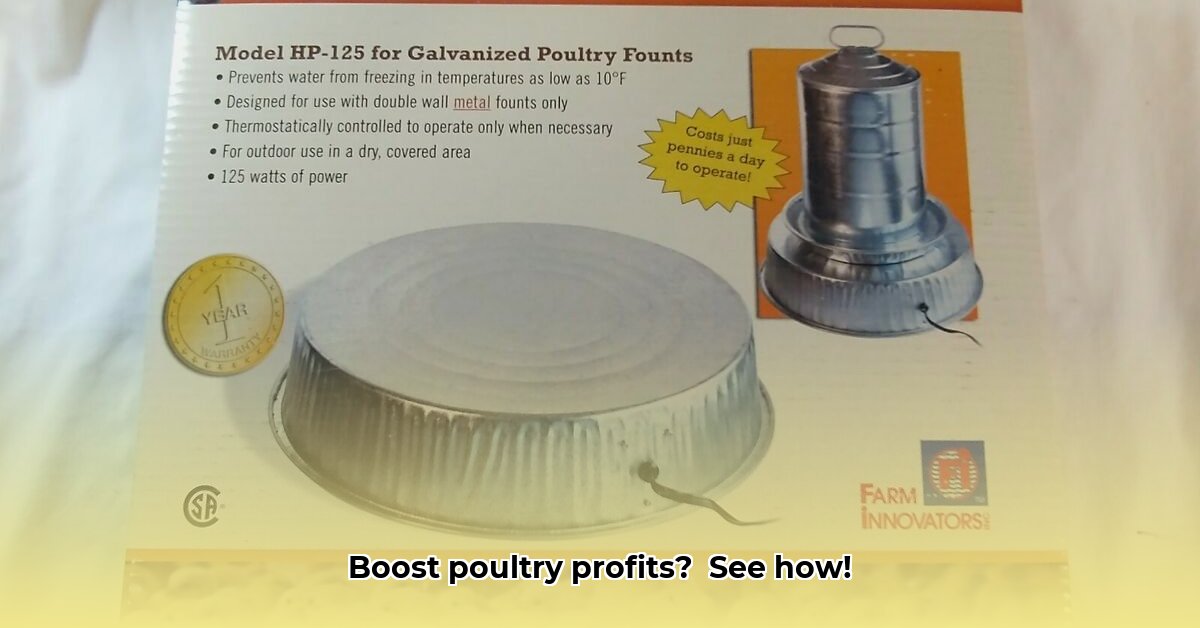
Imagine this: It's a frigid January morning. You trudge out to your chicken coop, only to find the water troughs frozen solid. Your chickens are thirsty, stressed, and potentially at risk of frostbite. This is a scenario many poultry farmers face, leading to increased labor, higher feed costs, and compromised bird health. But what if there was a simple, cost-effective solution? Enter the Tractor Supply chicken water heater. This guide will show you how this seemingly small investment can significantly boost your farm's efficiency and sustainability. For more information, check out this helpful resource on Tractor Supply heaters.
Tractor Supply Chicken Water Heaters: Year-Round Hydration and Health
Tractor Supply offers a range of chicken water heaters designed to provide consistent access to warm water, regardless of the outside temperature. This simple change can revolutionize your poultry operation, leading to healthier birds, reduced labor, and significant cost savings. Let's delve into how this investment improves both your bottom line and your environmental impact.
Choosing the Right Heater: Matching Needs to Models
Selecting the ideal Tractor Supply chicken water heater hinges on three key factors: flock size, budget, and desired features. Consider these carefully before making your purchase:
- Flock Size: A small flock (under 12 chickens) might only need a basic, smaller-capacity model. Larger flocks require heaters with greater capacity to ensure sufficient warm water for all birds. Don't underestimate your future growth when sizing your heater!
- Budget: Prices range from economical basic models to premium options with advanced features like thermostats. Establish a budget before browsing to avoid impulse buys.
- Features: Basic models offer simple heating, while mid-range and premium options include temperature control, multiple watering points, and more durable construction. These features impact both convenience and longevity.
Here's a simplified overview of available options (Note: Specific models and pricing vary by location and availability):
| Model Category | Capacity (Gallons) | Key Features | Approximate Price Range (USD) |
|---|---|---|---|
| Basic | 2-5 | Simple heating element, easy cleaning | $20 - $40 |
| Mid-Range | 5-10 | Thermostat, potentially multiple outlets | $40 - $70 |
| Heavy-Duty/Premium | 10+ | Durable construction, larger capacity, advanced features | $70 - $150+ |
Remember: These are estimates. Always check current prices at your local Tractor Supply store.
Installing Your Heater: A Safe and Simple Process
Installation is straightforward, but safety is paramount. Follow these steps meticulously:
Preparation: Thoroughly read the manufacturer's instructions. Gather necessary tools: screwdriver, pliers, possibly a drill (depending on the mounting method), and ensure you have access to a GFCI-protected outlet (Ground Fault Circuit Interrupter – essential for electrical safety). How many farmers have been shocked by improper wiring? It's a risk worth avoiding!
Mounting: Securely mount the heater to a coop wall or sturdy stand, selecting a location convenient for filling and cleaning.
Electrical Connection (Caution!): Connect the heater to the GFCI outlet, adhering precisely to the wiring diagram. Double-check all connections. If unsure, consult a qualified electrician – it's better to be safe than sorry.
Testing: Fill the heater with water, turn on the power, and monitor the temperature for a few hours before allowing the chickens access.
Maintenance: Keeping Your Heater in Top Shape
Regular maintenance is crucial for heater longevity and efficiency:
Weekly Cleaning: Remove any algae or mineral buildup to prevent bacterial growth and keep water clean. A simple rinse with soapy water is usually sufficient.
Leak Checks: Regularly inspect for leaks to prevent water damage and electrical hazards. Address any issues immediately.
Winterization (if needed): In extremely cold climates, take extra precautions to prevent freezing. Consult the owner's manual for specific instructions. Proactive measures prevent costly repairs!
Tractor Supply Heaters vs. Alternatives: A Sustainable Comparison
While Tractor Supply heaters offer consistent warm water and reduced water waste, other systems exist. Choosing the best option depends on your specific needs and climate.
| System Type | Advantages | Disadvantages | Water Efficiency |
|---|---|---|---|
| Tractor Supply Heater | Consistent warm water, improved bird health, reduced labor | Higher initial cost, electricity consumption | High |
| Nipple Drinkers | Water conservation, reduced contamination | May not suffice in extreme cold, require secondary water source | High |
| Open Trough Systems | Low cost | Prone to contamination, freezing, high water waste | Low |
A combination system (heater supplemented by nipple drinkers) often provides the best balance.
Sustainability and Cost Savings: The Big Picture
A Tractor Supply chicken water heater contributes significantly to sustainable poultry farming. While it consumes electricity, it drastically reduces water waste associated with frozen troughs or frequent water changes. This translates directly into economic savings and a smaller environmental footprint. Dr. Anya Sharma, Professor of Sustainable Agriculture at the University of Minnesota, states, "Efficient water management is crucial for sustainable poultry farming. Reducing water waste directly impacts both profitability and environmental impact."
Cost-Benefit Analysis: Long-Term Returns
The initial investment in a Tractor Supply chicken water heater is easily offset by long-term savings in labor, feed costs, reduced disease risk, and improved bird health. Consider it an investment in the overall health and productivity of your poultry operation. The reduced stress on your birds alone makes it worthwhile!
Actionable Steps to a More Efficient and Sustainable Poultry Farm
Here are three key takeaways to enhance your poultry operation:
Invest in Efficient Water Systems: A Tractor Supply chicken water heater is a crucial step towards minimizing water waste, improving bird health, and reducing labor.
Implement Strategic Feed Management: Ensure proper feed storage, monitor consumption rates, and adjust rations to minimize waste and optimize bird nutrition.
Embrace Technology: Modern tools and techniques can significantly streamline your poultry farming operations and enhance overall sustainability.
By combining efficient equipment with smart management practices, your poultry operation can thrive both financially and environmentally. The investment in a Tractor Supply chicken water heater is a first step towards a more sustainable future for your farm.